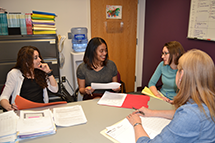The Health Psychology and Neurobehavioral Research Group has a training program for students interested in psychology at many different levels, from undergraduate volunteers to postdoctoral fellows. Students have the opportunity to gain valuable experience working with chronically ill populations and learning about all aspects of clinical research. Typically, our group of trainees is comprised of clinical psychology graduate student externs, undergraduate research assistants, and postdoctoral fellows, depending on funding availability.
Specific Opportunities
- Administering comprehensive psychological assessments with medical patients (children through adults)
- Observing and learning new assessment techniques
Conducting individual therapy focused on coping with illness or associated treatments
- Assisting with preparation of manuscripts and/or conference presentations/posters.
Research Investigations
Children through adults with cancer, neurofibromatosis type 1 (NF1), and sickle cell disease are among the patients being evaluated on current protocols. Some ongoing and recent topics of research investigations are:
Effects of the disease and treatment on neurobehavioral functioning and quality of life
- Acceptance and Commitment Therapy for adults with sickle cell disease and parents of children with genetic syndromes
- Appearance concerns about children through adults with visible tumors
Recent Publications
View a list of recent publications.
Contact Us
We participate in the Greater Washington area externship consortium. Please email a CV, a letter of interest stating how your education and career goals align with our program, and two letters of recommendation to Dr. Staci Martin (martins@mail.nih.gov). The deadline is February 14th. For more information about training opportunities with us, please contact our Training Director, Staci Martin, Ph.D. via email or phone at 240-760-6025.
Activities
Trainees with the Neurobehavioral Group participate in numerous didactic activities, such as weekly case conferences, monthly journal club discussions, individual and group supervision with a licensed psychologist, and educational seminars and symposiums sponsored by various NIH institutes.
